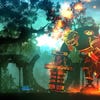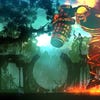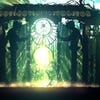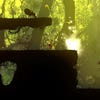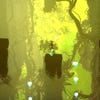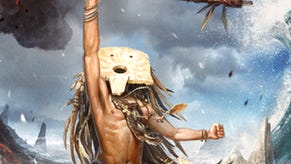Outland
Redshift.
As with Ikaruga, each shift in polarity pushes you between different threats and different rewards. When you're red, you can absorb red projectiles harmlessly, but cannot attack red enemies, and the situation is reversed when you're blue.
On top of that, the game throws in panels – or spike pits – that can only be activated in certain polarities, and ledges and walls that won't be available if you're not aligned to their particular hue. Having traversal tied into a mechanic that's often reserved for combat throws up some truly ingenious gauntlets to run, and it's here that the heart of Outland's challenge lies.
So there are staircases that will only exist if you're in red mode, and that are filled with enemies you'll need to be in blue mode to attack. There are spiralling waves of bullets you'll need to be in blue mode to absorb, surrounded by spikes that won't slide back into the floor unless you're red. There are sections where fountains fire beams of alternating colours, criss-crossed by patrolling guards of alternating colours, all perfectly synced to a devious rhythm. Finally, there are bosses – smart, stylish, multi-pattern bosses – that have you switching back and forth so quickly that you'll briefly appear purple.
Outland is an adventure of a decent size, too: well signposted, nicely mapped and filled with plenty of handy teleports and hidden areas to seek out on subsequent replays. The challenge gets fairly steep towards the end, but – aside from the odd prolonged boss – the checkpointing is not too sadistic. On top of that, there are good online options, with co-op play available across story and arcade modes, and a handful of unlockable challenges to power through, too. (We've been unable to get games to connect so far, so we haven't been able to try these modes out. We'll update this article accordingly when we've been successful, however – and in the meantime, we apologise.)
There's something a little frosty about Outland's particular brand of mechanical brilliance at times, and it would be nice to find a genuine surprise amongst the skills you unlock. But brilliance is still brilliance, however it's dressed up.
In place of character, Outland is never less than pretty; instead of originality, you get cold, hard intelligence. As with Super Stardust and Dead Nation, Housemarque has once again proved it's a fearsomely talented quick-change artist of a studio, able to take any genre and get to the guts of it quickly and with a chilly efficiency.
Don't play Outland because you expect it to be charming and filled with personality, then: play it because of the swooping, speeding cleverness of its design. Play it because of the craft.

